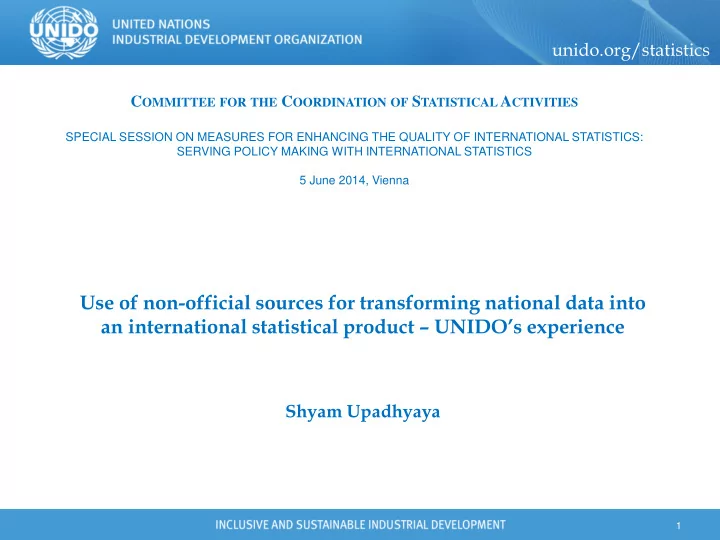

unido.org/statistics C OMMITTEE FOR THE C OORDINATION OF S TATISTICAL A CTIVITIES SPECIAL SESSION ON MEASURES FOR ENHANCING THE QUALITY OF INTERNATIONAL STATISTICS: SERVING POLICY MAKING WITH INTERNATIONAL STATISTICS 5 June 2014, Vienna Use of non-official sources for transforming national data into an international statistical product – UNIDO’s experience Shyam Upadhyaya 1
unido.org/statistics Outline of presentation • Data collection and production process in UNIDO Statistics • Data transformation • Non-official sources and their use in data transformation • Final remarks 2
unido.org/statistics Data collection from national sources • As per UN mandate, UNIDO maintains an international industrial statistical database and disseminates data products globally • Data are received through the returned General industrial statistics questionnaires sent to NSOs • Each questionnaire is prefilled for previous years with data reported by NSOs • Data are supplemented with metadata related to the primary source and the reporting institution 3
unido.org/statistics Task of UNIDO Statistics • Transforms national data into international data products National data are reported with: - deviations from international standards that affect comparability - missing data - inconsistencies with earlier reported or published data • Maintain the quality of data products intended for international users – Produce data as per quality assurance framework – International comparability - one of the major quality dimensions of UNIDO Statistics • Ensure that country data in the UNIDO database is generally consistent with those in the national database 4
unido.org/statistics Status of data sources Non-official Official • Data reported by NSOs or line • Data compiled and disseminated by ministries to UNIDO international agencies (e.g. WDI) • Commercial data providers, • Data published on official web-sites or printed reports of NSOs knowledge institutions (Penn World Tables, EIU etc.) • Estimates using a combination of • Results of the survey jointly sources conducted with NSOs under UNIDO funded projects • Imputed data • Data supplied to partner international • Estimates generated from time-series models – forecasts, nowcasts agencies and transferred to UNIDO (for example data from UNSD, OECD) 5
unido.org/statistics Stages of data transformation Stage I: Data are stored in the database after correcting obvious errors in reporting (these data are used to pre-fill the questionnaire) Stage II: - Data are adjusted to maintain consistency - Estimates are generated from reported data - Published data in official publications, web-sites - Survey data from UNIDO funded projects Stage I and II data are considered official and are published in the International Yearbook of Industrial Statistics 6
unido.org/statistics Metadata presented in the Yearbook Confirmation of official data source 7
unido.org/statistics Further stages of data transformation … applied to the database and electronic data products Stage III: Split or combination of reported data to obtain the comparable series (estimated ratio may be used) Stage IV: Imputation of missing data within reported time series (Interpolation) – as per methodological guide for imputation Stage V: Data are reported with varying time lags, by country and sometimes by variable. Data are brought to a single latest year (Extrapolation) Nowcast of value added in manufacturing and mining and utilities value added are published in Yearbooks. 8
unido.org/statistics Database and electronic data products • Electronic data products are meant for wider user groups – knowledge institutions, businesses and policy makers • Data are presented in longer time series – INDSTAT2 database 1963 to latest year • Wider geographic coverage – around 200 economies are presented • As the number grows – missingness of data increases, but missing data create less problems than dubious data • Imputation and estimation made at stage 3-5 use data from non- official sources 9
unido.org/statistics Extent of missingness in database • Number of observations vary across variables and years • Missingness is higher for latest years • For each missing variable there should be at least one auxiliary variable for which data required for imputation is available • Information for auxiliary variables may come from both official or non-official sources • Imputation helps reduce the cases of missingness in the database 10
unido.org/statistics Status of the end result • After transformation data may no longer remain exactly the same as in the national database. Its status is categorized as international data product • These products are overwhelmingly based on official sources, however, non-official sources are used to improve the data quality in terms of their coverage and consistency • UNIDO does not replace officially reported data, with own estimates but can suppress data that are significantly inconsistent • UNIDO does not conduct a parallel operation or post enumeration survey in any country in order to compare accuracy of officially published data 11
unido.org/statistics Concluding remarks • National and international data producers are facing different kinds of users’ demands • Transformation of national data requires a reasonable degree of adjustment to achieve international comparability. It should improve not distort the quality of data • International agencies can assist NSOs in developing capacity but cannot run their own data collection programme. Therefore, official national data remain the main source of international data products 12
unido.org/statistics Thank you! For further inquiry contact UNIDO Stat-Info services at stat@unido.org 13
Recommend
More recommend